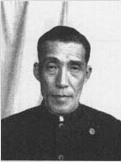据古海忠之1954年3月笔供,他1900年出生,东京都人。1932年7月参加侵华战争,曾任伪满洲国国务院总务厅主计处特别科长、处长、经济部次长、总务厅次长兼企划局局长等职。

古海忠之
重要罪行有:
1936年7月,“参加关东军和政府主持的有关日本开拓民20年百万户入植计划的会议。参预决定本计划。”
1936年9月,“参加数次关东军和政府主持的制订开拓5年计划的会议。参预决定该计划。”
1937年10月,“屡次参加关东军和企划处主持的有关10年鸦片断禁政策的会议。参预审议,建议缓和禁烟方案并表决该政策。”
1943年4月下旬,“创设保安拘留制度和思想矫正制度。”
1943年4月,“批准在奉天、吉林和四平的平原地区栽种鸦片的试验圃。以后力图扩大。”
1945年4月,“向华中汪政权卖了鸦片10万两”。
Abstract of the Written Confessions in English
Tadayuki Furuumi
According to the written confession of Tadayuki Furumi in March 1954, he was born in Tokyo, Japan in 1900. In July 1932, he took part in the War of Aggression against China and was successively appointed as special division chief and section chief of accountant office of Ministry of General Affairs, undersecretary of Ministry of Economic Affairs, undersecretary of Ministry of General Affairs and director general of Planning Bureau.
Major offences:
July 1936:“took part in the meeting, presided over by the Kwantung Army and the Japanese government, on the plan of a million households of Japanese pioneers immigrating to China in 20 years. I made contribution to the decision of this plan”;
September 1936:“took part for several times in the 5-year-plan formulating meetings, which were presided over by the Kwantung Army and the Japanese government, and made contribution to the decision on this plan”;
October 1937:“took part in the meetings, presided over by the Kwantung Army and the Planning Bureau, on the 10-yearopium cessation policy. I took part in the discussions, suggesting easing the opium cessation policy, and voted on the policy”;
April 1943:“gave permission to plant opium in the test fields in the plains of Mukden, Jinlin and Siping, to be expanded in the future”;
April 1945:“I sold 100,000 liang (1 liang = 50 gram) of opium to the puppet government of Wang Jingwei in Central China.”
(来源:国家档案局网站,编辑 Helen)